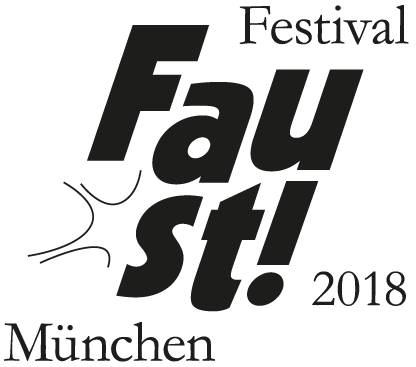FAUST III
DER TRAGÖDIE DRITTER TEIL
von Peter F. Schmid
Theaterkritik Süddeutsche Zeitung 29. Mai 2018
Play it again, Heinrich
| Faust muss erneut auf die Erde. Mephisto hat im Himmel erfolgreich protestiert. Diesmal führt er einen Faust des 21. Jahrhunderts in díe innere Welt und in die Zukunft der Menschheit. Er fährt mit ihm und uns buchstäblich vom Himmel durch die Welt zur Hölle, wobei im Open Air Stationentheater das Publikum die Spieler von Szene zu Szene begleitet. Bis es am Schluss zum großen Exorzismus und Showdown kommt. |
Faust muss nochmals auf die Erde. Mephisto hat im Himmel erfolgreich dagegen protestiert, dass er ihm (am Ende von „Faust II“) weggeschnappt worden ist. Faust will keinesfalls nochmals von vorne beginnen. Aber Mephisto hat etwas anzubieten, das ihn reizt: Er führt Faust nach der kleinen (Faust I) und der großen (Faust II) in die „innere Welt“ und bietet ihm nicht weniger an, als ein „Menschheitstherapeut“ zu werden.
In bunten Bildern führt ihn und uns Mephisto im wahrsten Sinn des Wortes „vom Himmel durch die Welt zur Hölle“, wobei das Publikum die Spieler von Szene zu Szene begleitet. Der Weg führt dabei „ins Unbetretene“.
Nach einem buchstäblichen Höllentrip wird Faust u.a. zum Wirtschaftsboss und Friedensnobelpreisträger, zum Zirkusdarsteller und Kriminellen, zum Politiker und Sozialrevolutionär, zum Pilger und TV-Star, zum ebenso lustgierigen wie bezie-hungsgestörten Partner einer Liebesbeziehung. Er setzt sich sowohl mit seinen inneren Wünschen, Ängsten, Hoffnungen und Widersprüchen auseinander als auch mit seinen Vorstellungen und Ideen zum gesellschaftlichen Zusammenleben. Dazu gehören grundlegende Menschheitsfragen, wie u.a. die nach Gut und Böse, nach Gewalt und Beziehungsgestaltung, nach dem Bedürfnis, ein Mann zu sein, anders als sein Vater war und anders als seine Mutter ihn haben wollte, der Versuch, ein faires Verhältnis zu Frauen zu finden, Probleme einer authentischen Auseinandersetzung mit dem Fremden, mit Kunst und Theater, mit der bevorstehenden technischen Revolution durch intelligente Maschinen, mit verschiedenen spirituellen Angeboten, last but not least mit der Frage, wie er sich als Gestalter seines Lebens begreifen kann.
Das Publikum wird vom Master of Ceremonies durch, wie er behauptet, „sein“ Stück geführt, das – anders als das „überkommene Menschheitsdrama Goethes“ – ein flammender Appell dazu sei, sich selbst als Spieler und Gestalter seines Lebens zu erfinden und sich von überholten Wertvorstellungen zu lösen.
Bis es am Schluss zum großen Exorzismus und Showdown kommt.
Play it again, Heinrich |
English |
| Faust is sent back to earth. Mephisto’s protest in heaven was successful. This time he guides a 21st century Faust into the inner world and into humankind’s future. Faust is spared nothing. Mephisto leads him and us literally from heaven through earth to hell. Until, finally, the great exorcism and showdown takes place. |
Faust is sent back to earth. In heaven, Mephisto’s protest that Faust was snatched away from under his nose (at the end of “Faust II”) was successful. Definitely, Faust does not want to start over again. But Mephisto has an offer that rouses Faust’s desire. After the little (Part I) and the great (Part II) world, he promises to guide him into the inner world and become nothing less but a therapist for all humankind.
In various adventures Mephisto guides Faust and us in the full sense of the phrase “from heaven, through the world, to hell”, in the open air station theatre with the audience accompanying the actors from scene to scene.The path leads into “un-entered territory”.
After a literal trip to hell Faust becomes CEO of a pharmaceutical company and is awarded the peace nobel price, he finds himself as circus artist and criminal, politician and social revolutionary, pilgrim and TV star, partner in a love relationship, greedy for lust and disordered in forming a lasting relationship. He is preoccupied with his inner desires, fears, hopes and contradictions as well as with his ideas and plans for constructive social co-existence. This includes fundamental issues like good and evil, interpersonal relationship building and violence, the need to be a man different from the way his father was and different from how his mother wanted him to be, the attempt to find a fair relationship with women, authentic dealing with the unfamiliar, with art and theatre, with the oncoming technical revolution by intelligent machines, with diverse religions and spiritual offerings, last but not least with the question how to comprehend oneself as the creator of one’s own life.
The audience is guided by the Master of Ceremonies through – as he claims – “his” play that, different from Goethe’s old-fashioned drama of humankind, is a passionate claim to invent oneself as the player and actor in one’s game of life and to get rid of outdated values and conditions of worth.
Until, finally, the great exorcism and showdown takes place.



